Running a role playing game is hard. It takes a lot of work, practice, and an ability to act. You have to be an author, a game designer, and a mathematician. It's also one of the most fun things you can ever do; It's as close as you can get to playing God without having suspicious Kool-Aid parties. When an entire group is on point both players and Dungeon Master are going to be shocked at how quickly the time goes by. You'll find yourself begging to play for another thirty minutes even though you have to get up for work in 6 hours. I want to share some things I've learned while playing and running tabletop role-playing games. Hopefully this will let you and you friends have the best time plumbing the depths of your shared creativity.
When running a game you, the Dungeon Master (Storyteller, Game Master, Chronicler, Jerk Behind the Screen) have a lot of control. The happiness and enjoyment that your players derive from your game is your responsibility. You also want to have fun with them. The difference between an RPG story and a book or movie or video game is that the main characters are not under your control. That's the real beauty of roleplaying games. I know that sometimes it feels like herding cats, but if you know how to engage your players by properly challenging them and empowering them, you can craft a truly (and I hate this word, but now is the time to use it) epic narrative that you and your crew can be proud of.
What is Empowering?
Empowering your players means making them feel good about what they are doing. This is a game, a shared story, and a hobby that people will want to collaborate on. They aren't characters in your story, they are people helping you write the narrative as you tell it. If they are not having fun, then you aren't doing the best job you can as a DM. Sometimes it seems like players don't listen and will fight you every step of the way but it is your job to meet them halfway. They will respond positively if you make them feel big and important and they'll come back for more if they are having a good time.
What is Challenging?
Challenging your players is the opposite side of the coin to empowering them. Creating drama is necessary for the narrative to maintain a sense of urgency, so the group isn't drifting along from one cupcake party to the next. It is a delicate balance to strike, because if your game is too empowering it becomes boring and if your game is too challenging your players will get discouraged.
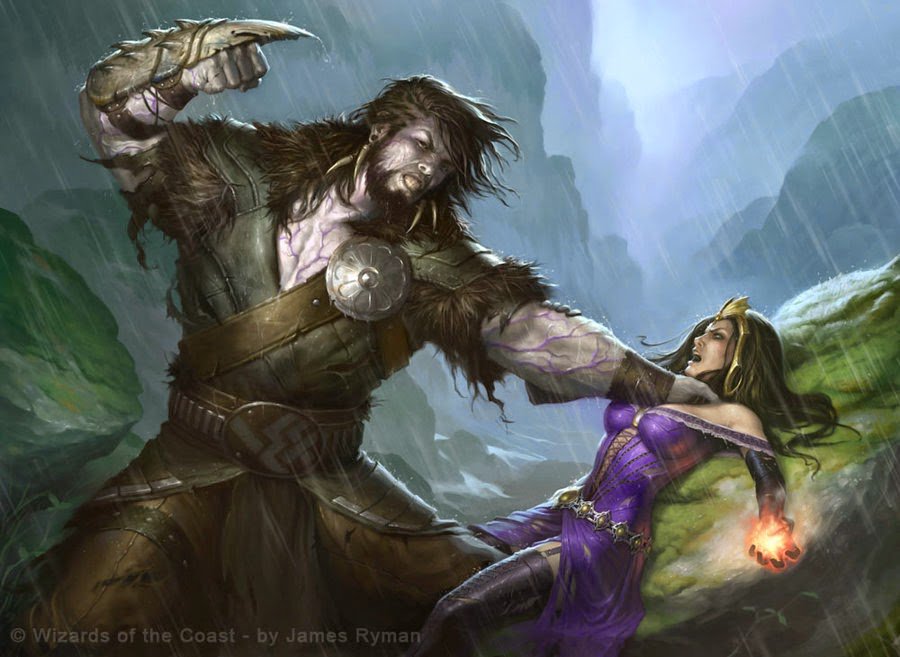
That's going to hurt. But she'll feel really cool when she wins.
The best way to do it (and this takes practice) is to give your players a difficult time reaching their goals. That may be a new item, gold, or a stat boost, but challenge makes it more valuable to them. They will feel more heroic and more empowered when they overcome a larger, more difficult obstacle. Obstacles can come in a lot of different forms: enemies, forces of nature, or events. The specifics are up to you and your plot. The important point here is to know how to attack your players in a way that makes them feel good about succeeding while also making failure a reason to do better next time. If you kick your players too hard while they are down, they may resent it and not come back next time.
Know what the players want to do
Each player that sits down at your table is playing this game for a reason. Maybe they want to make the biggest baddest motherfucker with a greatsword and cleave their way into a pile of gold and wenches. Maybe they're the cunning type that wants to make the entire world acknowledge their skill and wit. Maybe they're a munchkin rollplayer that just wants to build a hyper optimized character and obliterate any statblock of monsters you can throw at them. Maybe they're a narrativist navelgazer (like me) and just want to tell a good story about the growth, journey, and death of a character. Understanding what the players want when they join you is an important part of playing this shared game.
If you have a player that is a bit of a problem, always running off on his own to try and solve crimes, or he seems unwilling to participate in combat, always trying to think his way past even the brawniest of enemies (I'm guilty of this one) then that player is feeling like his needs aren't being fulfilled. The easiest way to figure this out is to ask. “What do you want to play?” There's no shame in admitting that you aren't a mind reader. If you can tailor your content to stuff the players think is interesting, they will look forward to the game each week, excited to uncover more of your world and see where the exciting story takes them. They'll be more willing to sit through stuff they may not be totally into because they trust they can get a bit of limelight in the future.
Some DMs will write their world, plot, supporting characters, and set pieces without even knowing who will show up when they finally get a group together. There isn't any problem with that approach but it does run the risk of disappointing some number of your players. You may want to consider rewriting your plot at times. If the group seems to be a band of chaotic-evil baby-stabbing ne'er-do-wells, maybe tone down the heroic prophecy from the God of Light? If they want to fight and loot magical treasures, you might want to shelve the 1980's inner-city historically accurate gang war setting for another time.
I have the good fortune of knowing the people I play with and my groups have been relatively consistent over the last few years. I know which play styles my friends tend towards. I like to write up skeleton plots and general overviews of games and then present them to people I think might be willing to join in. If you can tell a good story that the players want to be a part of they may just be willing to join you on your pet project game next time.
Consequences
Bad things happen to good people. Hopefully, just enough to keep things interesting without making the good people want to take their snacks and go home. They can be playing exactly the game they want to play, having a good old time, but that doesn't mean that you don't get to play the game YOU want to play. If the players rescued a town from a local goblin menace, maybe the local gnoll population explodes. If they've deposed the evil king, perhaps there will be a brutal civil war between his sons. If they managed to sneak into a mage's tower and steal his Staff of Wonder, then they are now walking around with a huge target on their backs.
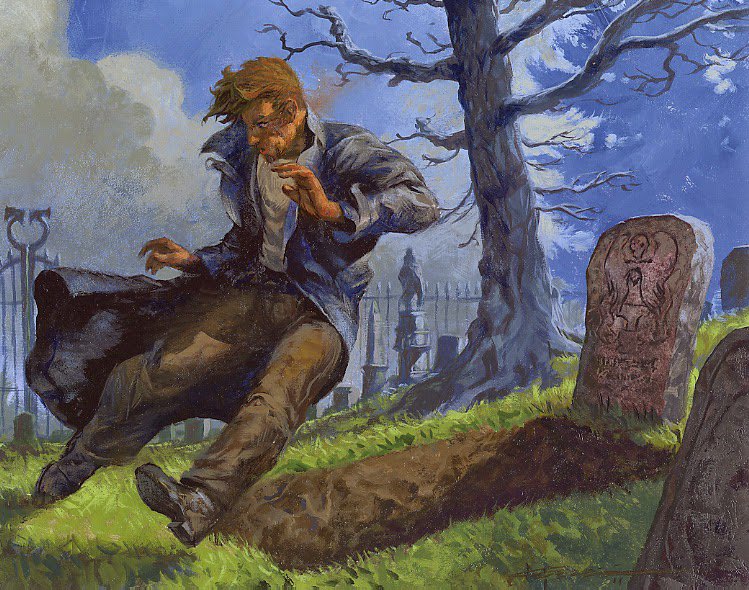
The constant cycle of threat-success-reward-new threat is what powers a narrative. No good movie or book can exist without conflict, so keep that in mind while spinning your tale. Conflict is critical to a good story and the consequences of solving a problem can be an easy and sensible way of introducing new problems to move your narrative along. It creates a cohesive chain of cause and effect that prevents your players from feeling exasperated and confused when you give them their 8th random encounter in a row. The severity of the new consequences can vary, and sometimes it's okay to just let them wrap up a problem with no loose ends. But how often does that happen in real life? Most people just stumble from crisis to crisis, and roleplaying games often feel the same way.
Player decisions matter
The players need to have free reign to decide what they want to do for themselves. It honestly doesn't matter if you think it's a bad decision or a good one, you only have a responsibility to react. If they decide to murder the kindly old king in his throne room in front of his garrison of guards? Say “guys, that's dumb, please rethink that.” If they don't, it's fine. Just make sure those guards respond appropriately: by stabbing the party in the butts until they die. If the party manages to overcome your response to their bad decision, that's fine too, but you may have to change how the world responds to them. Don't ignore the player's decisions just because you need that king alive later on to be sacrificed to the Dark Lord. Nothing feels more condescending than when a DM forces a deus ex machina to nullify the decisions of the party.
Sometimes there is no good solution
You may find it good to occasionally present your players with a choice between bad and worse. They CAN'T save everyone, or they must make a serious sacrifice in order to get the outcome they want. Giving them a choice gives the players the power to decide where the narrative is going to go. The drama that builds up when players have to struggle with making the best of a bad decision is healthy for the story. This is a powerful and memorable tool to use in your DMing arsenal. If you use it rarely that makes it all the more compelling. If the Demon Queen's ritual is about to come to a conclusion and someone has to sacrifice themselves to interrupt it, that choice is going to be a story that your players will tell for years.
Let them succeed
Saying “yes” to your players is more fun than saying “no.” If they want to try a daring and inventive plan that you hadn't thought of in your pre-game brainstorming don't just have a knee-jerk reaction and say no. Maybe climbing the castle walls instead of fighting through the carefully balanced and level-appropriate gauntlet of Orc warriors seems like a letdown to you, but the players see it as fighting smarter, not harder. When you validate their good decisions it makes the players feel clever and they feel like they have an active role in the story instead of being strapped into a theme park ride.
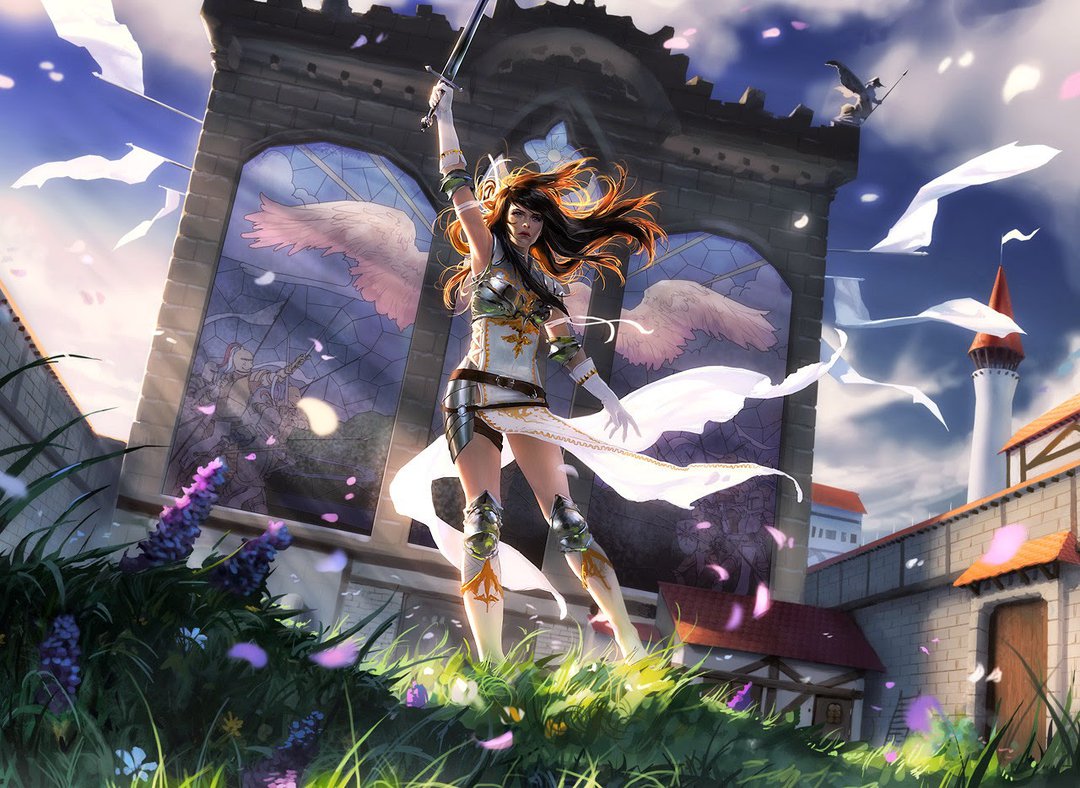
Nothing screams "Accomplishment" quite like angels that are screaming the word "Accomplishment."
Let them fail
A game where you can't lose isn't going to be fun. The chance of losing is what makes winning feel so fulfilling. If the players try something stupid, you are not obligated to let them succeed. Even a good plan can fail, if they get unlucky. Sometimes the dice fall all 1s. You shouldn't feel bad to say “you've fumbled your diplomacy roll, the Elvish king rises in a fury and commands your execution.” That's just a new obstacle for the players to overcome. Failure gives rise to new opportunities. Getting knocked down means they'll feel that much better when they come out on top the next time they encounter that obstacle.
Prepare for the unexpected
When your players come up with some wacky idea that you weren't expecting it may seem prudent to steer them back onto the steadier ground of your thoroughly mapped out plot. Some people can just toss out their notes and improve an entire scenario if the players miss a plot hook (or see a plot hook coming and shoot it dead [or run screaming from any signs of plot hooks]) I find it helpful to have a cache of ideas, set pieces, or other random and interesting bric-a-brac that the players can stumble upon. Maybe they don't want to go stop the evil overlord's plan to resurrect the corpse of the Sky-Goddess at this moment. They might want to rescue the miller's daughter from a cult of werewolves in a small town though. If you spend the time coming up with cool concepts that don't tie into your main plot you can drop them directly into the party's lap and it only makes your world seem more populated. They don't need to know that you're bullshitting as it goes along.
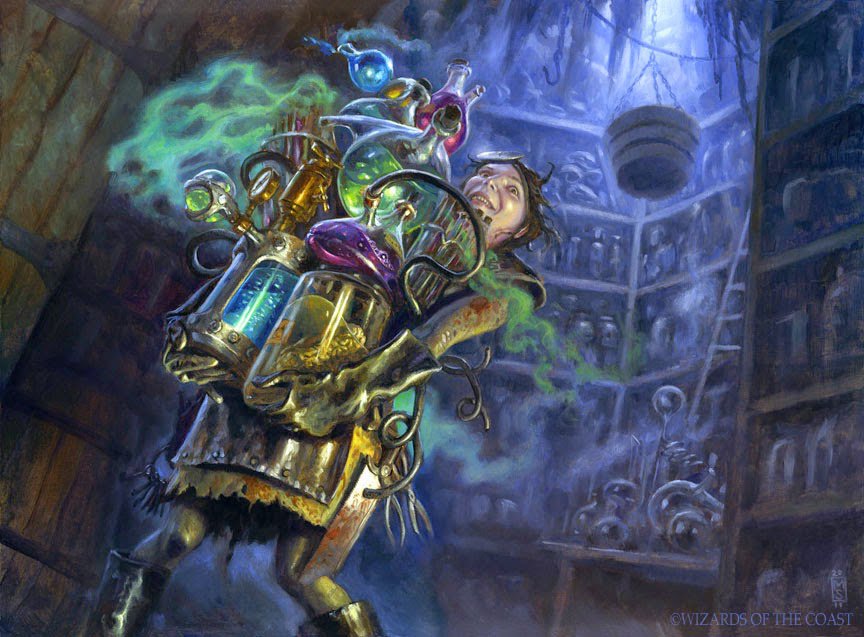
You never know what odds and ends may be useful.
Surprise them back
If they approach an obstacle with a good plan, it is okay to let it go off without a hitch. Sometimes, though, it's those unexpected hitches that make for good stories. If the news reporter's van just happens to be in the wrong spot at the wrong time, maybe your vampire character gets caught using his super strength to kill someone. That happened to me. Then we had to raid the news station to steal the footage. Good times.
Make them feel important
The players are the main characters. Don't steal the spotlight. If they were the ones who braved the horrors of the Mad Wizard's Tower, let tales of their endeavor spread far and wide. Villagers may whisper when they see the party come into town. A thankful farmer may buy them a drink for saving the countryside from the dragon's predation. If they brutally slaughtered an entire village because no one bought them drinks, make sure that people hear about it. Tales and legends spread from people talking, and if you let the party hear rumors (even incorrect ones) then you are having the world react to the players. If you make the world seem like a living, breathing place that responds to the players then it becomes a place they are invested in, a place they want to spend time. That doesn't mean you shouldn't have a slimy politician or dastardly knight claim credit for the party's exploits once in a while, that’s just another plot hook.
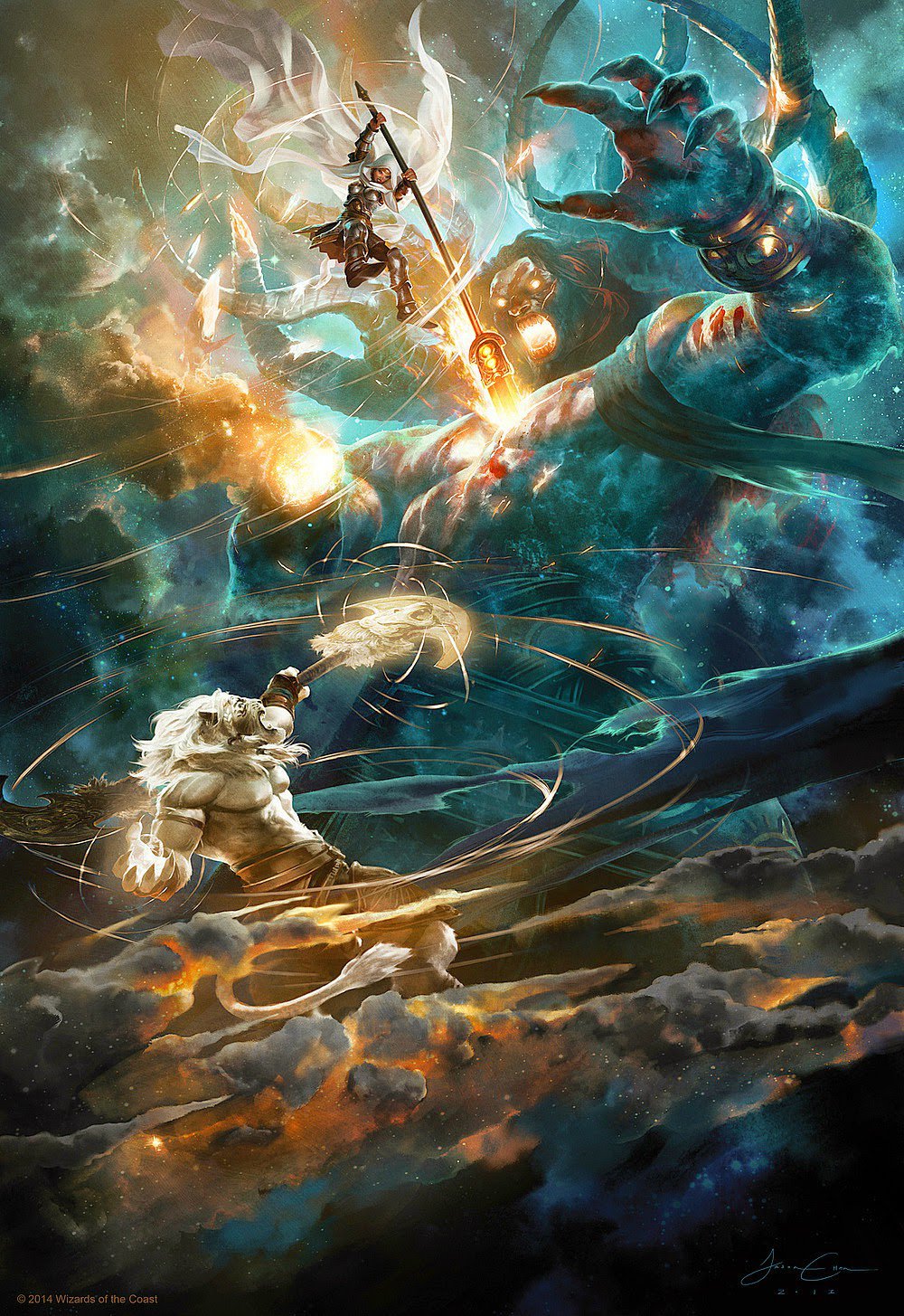
Killing gods should be reserved for end-game plot. Usually.
As an addendum to this, don't make a DMPC. That is a character that you wrote that you think is super awesome that “helps” the party on their way. You shouldn't be trying to play in your own game. I had a DM one time who had TWO DMPCs in the game, and they were both entirely more powerful, beautiful, smart, and fast than the rest of the party combined. That makes the players feel shitty. Don't do it. The best way to have fun is to make sure the players are having fun.
Make them fear death
The simplest, largest consequence in a roleplaying game is the threat of permanent death for the player character. Even heroes die. If the players don't feel that they are going to die, then they are not respecting your challenges. Not EVERY challenge has to be lethal, but it's certainly the most obvious and ever-present issue dealt with that the players can understand on a visceral level. The fear of death is part of the human condition. We play these games to have fun and escape the realities we live in, but a world where death is irrelevant is one that is hard to relate to. Without death as a consequence a game world begins to feel very video-game-y to me, and that is an entirely different medium.
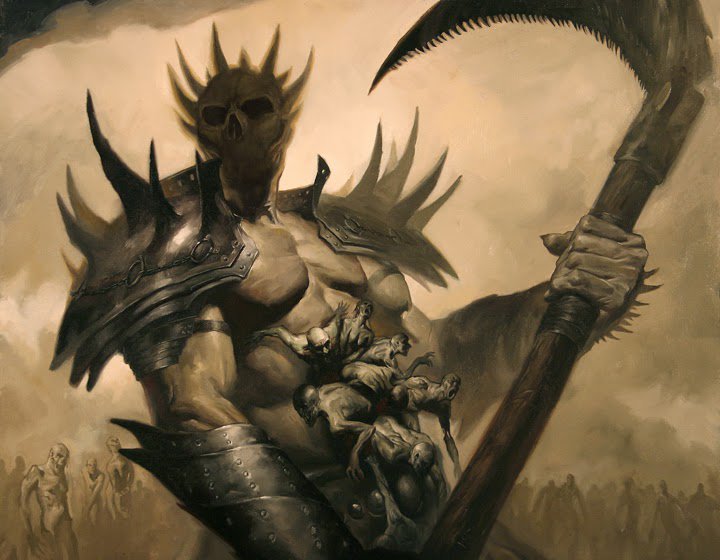
Death doesn't need to be personified so literally, but it helps!
You can make death irrelevant in a lot of ways. You can pull your punches and never have your monsters hit hard enough to really do any lasting damage. You can make resurrection cheap and freely available. You can make it so easy to make a new character that people are willing to risk their current characters in absurd situations for little reward. My general rule of thumb for monster design is one I learned in the first real campaign that I ran. My party of pirates was fighting underwater against a giant turtle creature. I gave the monster a whole ton of AC and a weak damage die and they spent about an hour with the two sides missing before the fighter got a lucky crit and killed the monster. Any fight where both combatants are equipped with proverbial wiffle bats is going to be boring as hell for both you and the players. If you are worried that you've got a bit of a turtle monster on yours hands then the easiest way to fix that is to double its damage output and halve its defensive stats. A monster that can kill you in one or two hits but dies just as quickly is a threat that HAS to be dealt with. It's exciting, edge of your seat combat that engages both sides.
Give them rewards
Successes lend themselves to great stories, more so if you can give the players a tangible reward for their good work. It could be as simple as a +1 sword or it could be a more nebulous thing such as the Duke owing a favor. In general I find it good to come up with rewards so that no specific player is intended to get them. It doesn't always have to be a “strict upgrade” in their gear. I prefer to have sweet loots make sense for the place they came from. While it's never a bad idea to give the players money because at worst they can just go buy that +3 shocking mace, it does feel better if they wrest that same mace from the cold, dead hands of a bone golem they spent all session fighting. If you raid a goblin encampment then you're going to find a lot of weapons and armor. If you raid a monastery, you might find expensive works of art or thousand-year-old jars of alcohol. A digital raid on a corporation's server might give incriminating data for blackmail purposes, or they could choose to let it loose to ruin the company's public image. Let the player have toys and let them play with them to their heart's content.
Break their toys
If you never give your players a lollipop then you can't drink their sweet, sweet tears when you take it away. This is a trick you don't want to overuse or else the players will not bother getting attached to anything they have out of fear that you will take it away from them. An alchemist character in a game I was playing had his bag of potions (read: his entire arsenal that he spent all of his time and money making) destroyed twice in two consecutive fights. He was immensely discouraged. While it was the smartest way for the enemies to disable him, it also made the game distinctly less fun for him. No one likes being totally neutered in a game. Shattering a weapon is something that the players should be wary of, but never expect to occur to them. It's always some OTHER guy that is left holding the broken hilt, right? That's what makes the tragedy so engaging and makes the drama that causes players to come back next time.
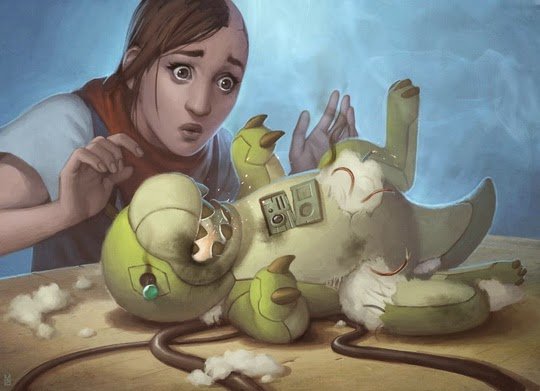
This is what your players should look like.
Tying it together
If you take away one thing from reading this, I want it to be a willingness to communicate with your group. Ask at the end of the session, “What did I do well? What did I do poorly?” I still do that even though I've been playing RPGs of all stripes for about a decade. You can always learn more. Don't be afraid to try new things. Maybe your friend's “wild west with zombies” game might be a flop, but that means his next one will be better if you give him good feedback.